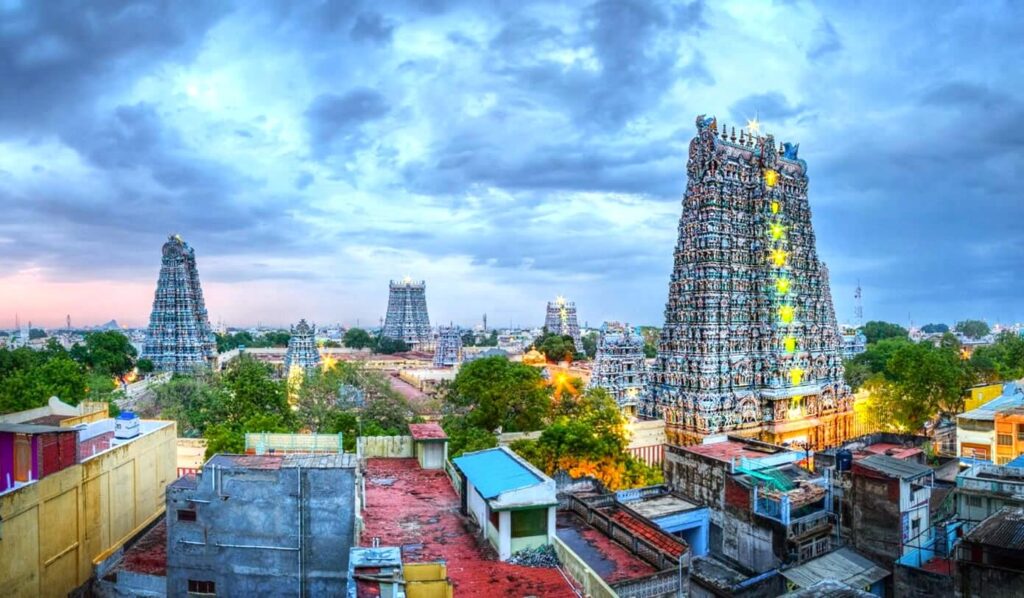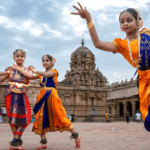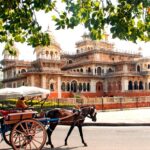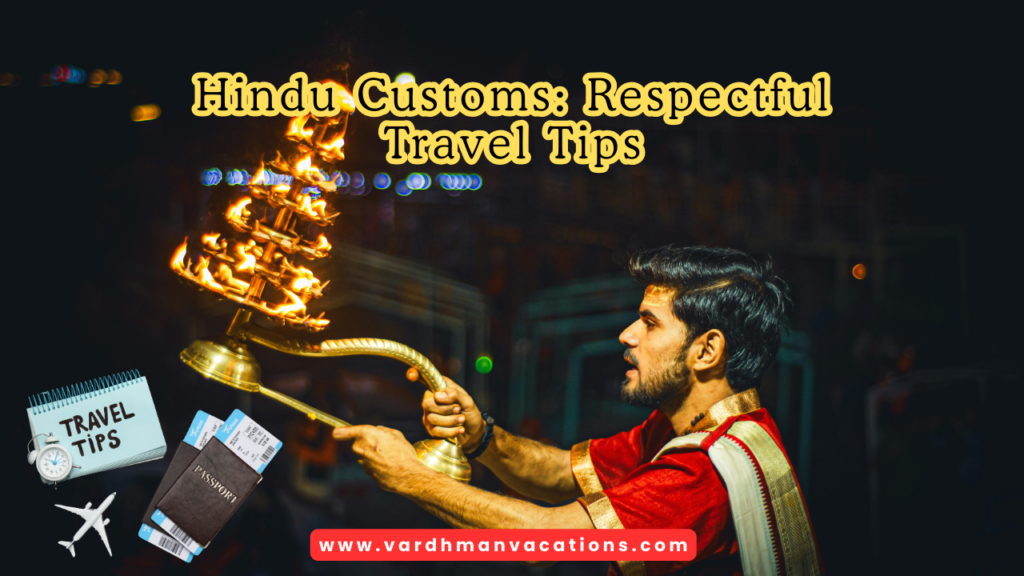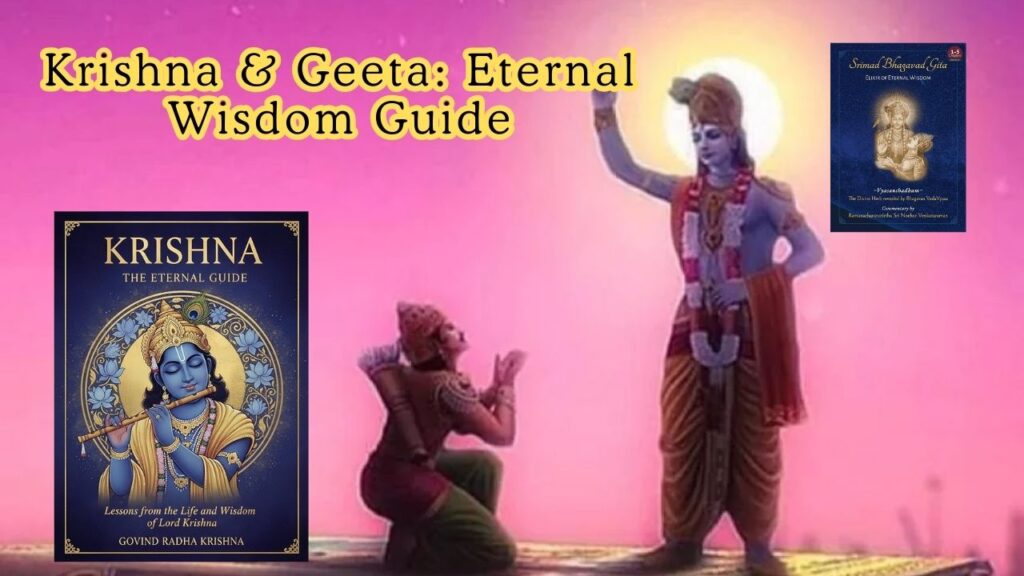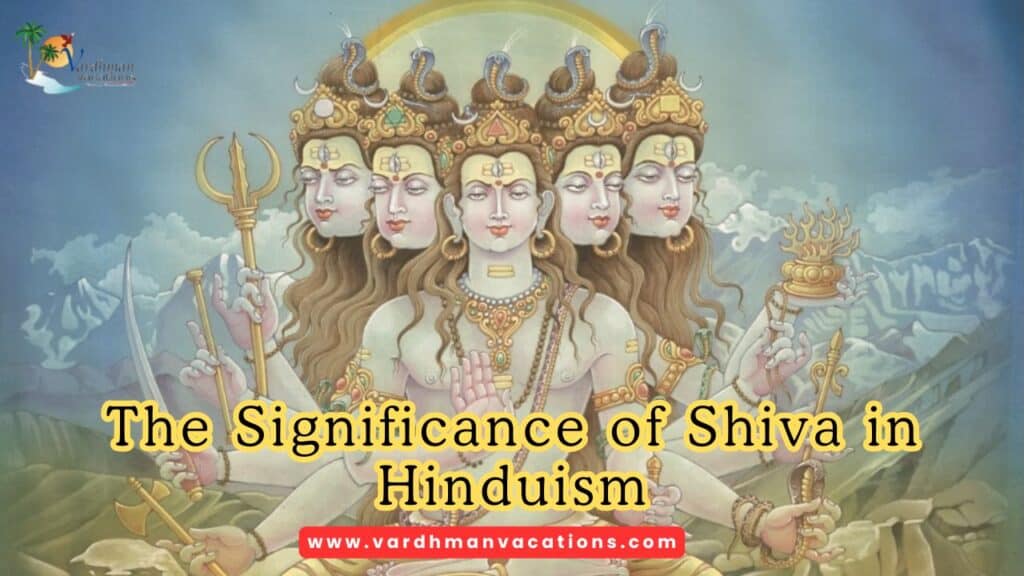Madurai, the cultural capital of Tamil Nadu, is known for its ancient and holiest temples, making it one of India’s most important pilgrimage sites. The city is famous for its religious and cultural heritage, as well as its unique lotus-shaped layout. Madurai is home to the renowned Meenakshi Sundareswarar Temple and numerous other ancient temples, attracting visitors from all around the world. The city’s rich history, architecture, and religious significance make it a popular destination for tourists seeking spiritual experiences and inner peace. Many temples of Madurai are reminders of its rich cultural and religious legacy. Let’s take a look at these temples that you must visit with family and friends.
Major Temples in Madurai
Meenakshi Sundareswarar Temple or Meenakshi Amman Temple, Madurai
Timings: 05.30 AM to 12.30 PM & 04.00 PM to 09.00 PM
Entrance Fee: For Foreigner – Rs.55 & For Indian – Rs.5 for Thousand pillar hall
Camera & Video Camera: Not allowed
Mobile Phone: Not allowed
Dress Code: Both males & females should wear any fully covered dress. Shots and trousers are strictly not allowed.
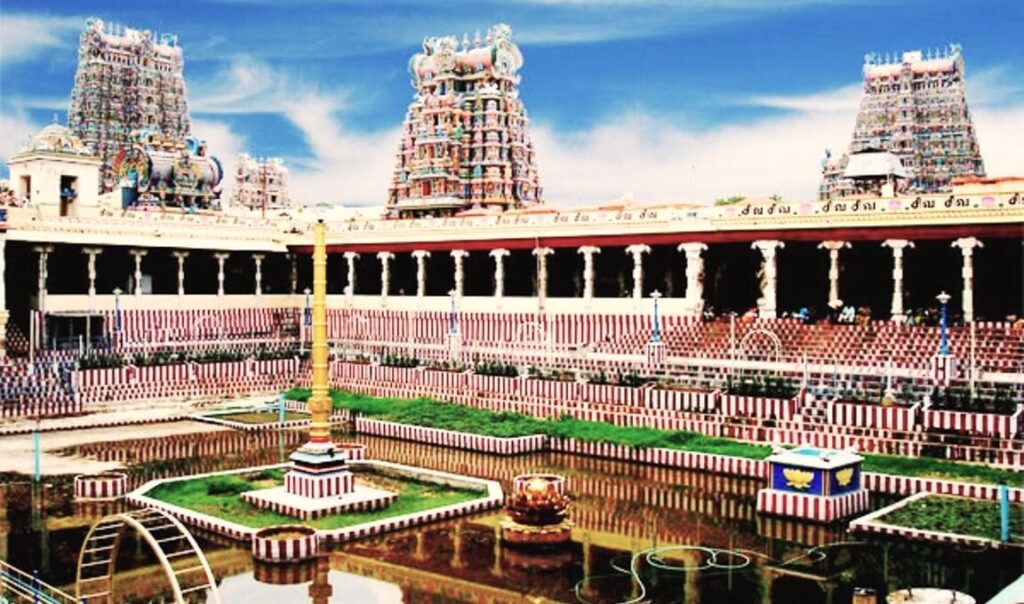
The Meenakshi Amman Temple in Madurai is dedicated to Parvati (Meenakshi) and her consort Shiva (Sundareswarar). The temple is believed to have been built about 2,500 years ago and has undergone various extensions and modifications. The most major changes took place during the reign of the Nayaka dynasty in the 16th and 17th centuries. The temple’s distinctive feature is its colorful gateway towers, embellished with elaborate sculptures of mythological figures and goddesses. The temple celebrates festivals throughout the 12 Tamil months of the calendar. It hosts a nightly ceremony that takes place every day for 45 minutes before the temple closes and is primarily attended by foreigners.
Estimated closure dates of Meenakshi Amman Temple
The Meenakshi Amman temple is closed three times a year for the float festival, the Puttu festival, and Lord Murugan’s heavenly wedding ceremony at Thiruparankundram temple. The upcoming closures are on August 16th, 2024 (Puttu festival), February 11th, 2025 (float festival), and March 14th, 2025 (Lord Murugan’s heavenly wedding ceremony at the Panguni Uthiram festival). Additionally, the temple is closed during solar and lunar eclipses, and the exact dates will be notified closer to the event. It’s important to note that the lunar calendar and local traditions determine festival dates, and they may be subject to change based on customs and rituals.
Thiruparankundram Murugan Temple, Madurai
Timings: 05.30 AM to 12.30 PM & from 04.00 PM to 09.00 PM
Dresscode: Traditional wear
Entrance fee: No
Camera fee: Rs.100
Video Camera fee: Rs.200
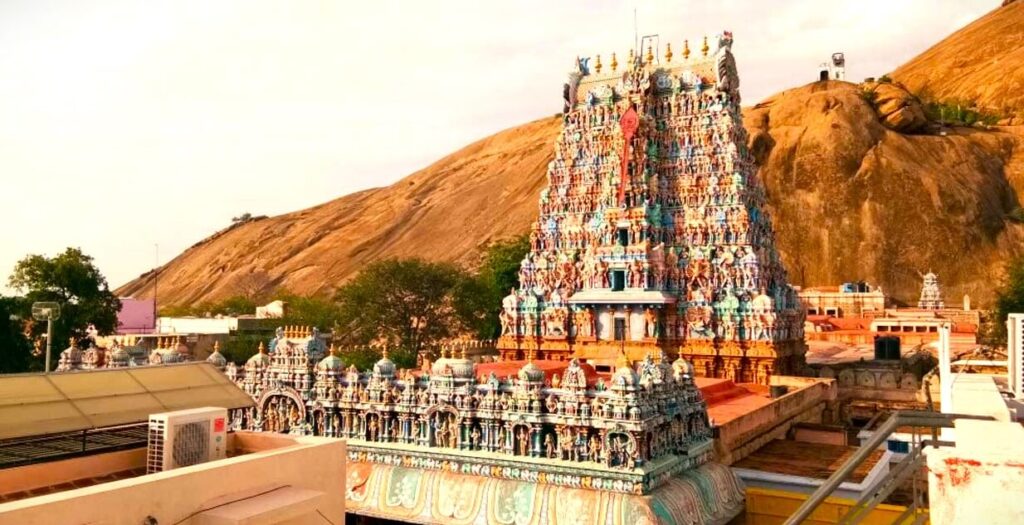
The Tiruparangundram Murugan Temple, also known as the Subramanya Swamy Temple, is a Hindu temple dedicated to Lord Murugan is a renowned pilgrimage site in southern India. It is located 8 kilometers from the city. The temple, built in the sixth century, is known for its rock-cut architecture. It is carved into the side of a hill and has tunnels and shrines. The primary shrine houses Lord Murugan’s idol along with his consorts Valli and Devasena. It is considered a holy place for marriages, with many couples choosing to marry within its walls. The temple is also famous for hosting the marriage of Lord Subhrahmanya.
The temple also houses the deities Shiva, Vishnu, Vinayaka (Ganesha), and Durga. The temple follows the Shaiva worship tradition, with six daily rites and three yearly feasts. The most popular celebration is Kantha Sashti, during the Tamil month of Aippasi (October-November). During this festival, the temple is decorated and devotees participate in the elaborate rites and celebrations.
Alagar Kovil Temple, Madurai
Timings: from 06.00 AM to 12.30 PM & from 04.00 PM to 09.00 PM
Entrance fees: No
Camera fee: Rs.50
Video Camera fee: Rs.100
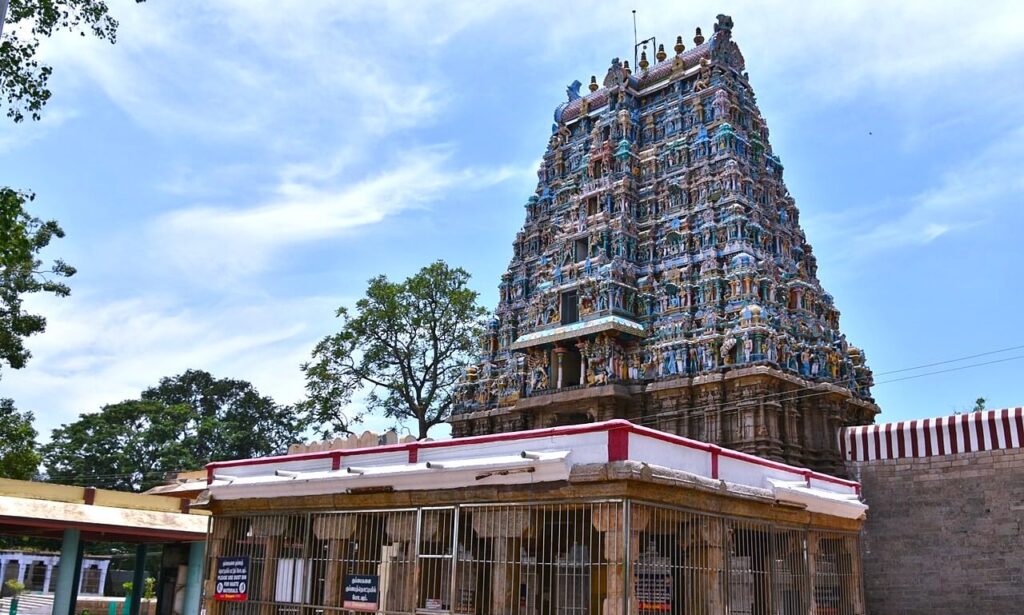
The Alagar Temple, also known as the Kallalagar Temple, is a major Hindu temple dedicated to Lord Vishnu that is located around 22 kilometers northwest of Madurai. The temple was constructed in the Dravidian architectural style. The temple complex has a magnificent five-tiered rajagopuram (gateway tower), a rectangular enclosure with towering granite walls, and beautifully carved mandapams (pillared rooms). Nestled amidst the Alagar Hills, the temple has tranquil atmosphere and captivating natural surroundings, which add to its allure. The temple celebrates a variety of festivals throughout the year. These include the float festival in February/March, the Navaratri festival in September/October, and Vaikunta Ekadasi in December/January. Each festival has its own rituals and traditions, attracting people from all walks of life.
Pazhamudhirsolai or Solaimalai Murugan temple
Timings: from 05.30 AM to 12.30 PM & 04.00 PM to 07.00 PM
Entrance fees: No
Camera fee: Rs.50
Video Camera fee: Rs.100
Dress code: Comfortable attire
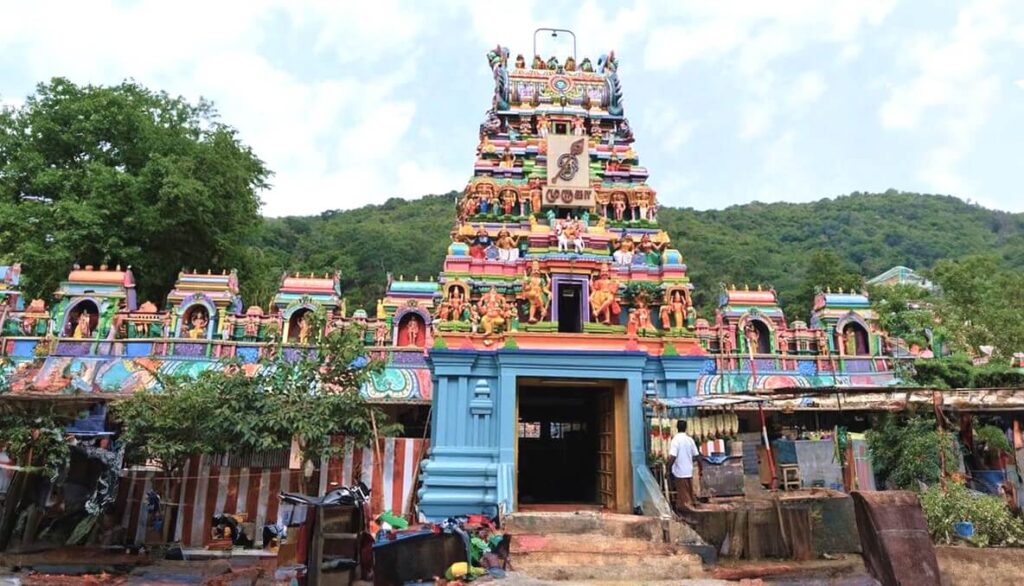
The Pazhamudhircholai Murugan Temple, also known as the Solaimalai Murugan Temple, is an important Hindu temple that honors Lord Murugan. It is one of Murugan’s six holy abodes in Tamil Nadu. The temple is located on Solaimalai Hill, about 22 kilometers north of Madurai, surrounded by deep woodlands. The temple has shrines dedicated to Lord Murugan, his consorts Valli and Devasena, and Lord Ganesha. It is a peaceful retreat with lush vegetation, providing an escape from city life. Many festivals are celebrated here, including the Tamil New year, Vaikasi Visakam, AadiKruthuka, Annual Abhishek Festival, Skanda Shashti, and Thirukarthigai Panguni Uthiram. People from all over the country visit the Pazhamudhir Solai Temple to seek blessings and experience spiritual bliss. The temple is also known for its beautiful wood and marble carvings and has become an important tourist destination in Madurai.
Vandiyur Mariamman Teppakulam, Madurai
Timings: 5 AM to 9 PM
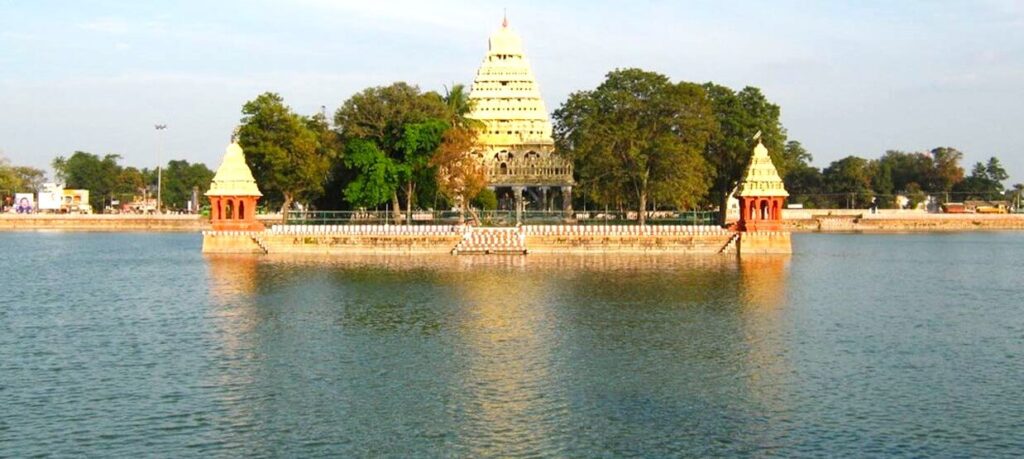
The Vandiyur Mariamman Teppakulam is a popular temple pond complex in Madurai, South India, spread over 16 acres and featuring a small manmade island with a temple of Lord Vigneshwara. This divine temple is situated about 5 km from the meenakshi temple. It has a huge tank in the compound of the temple and holds the record of being the biggest tank in the region of Tamil Nadu. The Mariamman Teppakulam is best visited during the “Float Festival” which takes place in the Tamil month of Thai (January-February), when thousands of lamps illuminate the complex. It is associated with legends and holds the record for being the biggest tank in the region of Tamil Nadu. The temple hosts various festivals and rituals with great pomp and pleasure.
Kochadai Muthaiah Temple, Madurai
Timings: 10.00 AM to 01.00 PM and 04.00 PM to 09.00 PM
Entrance fee: No
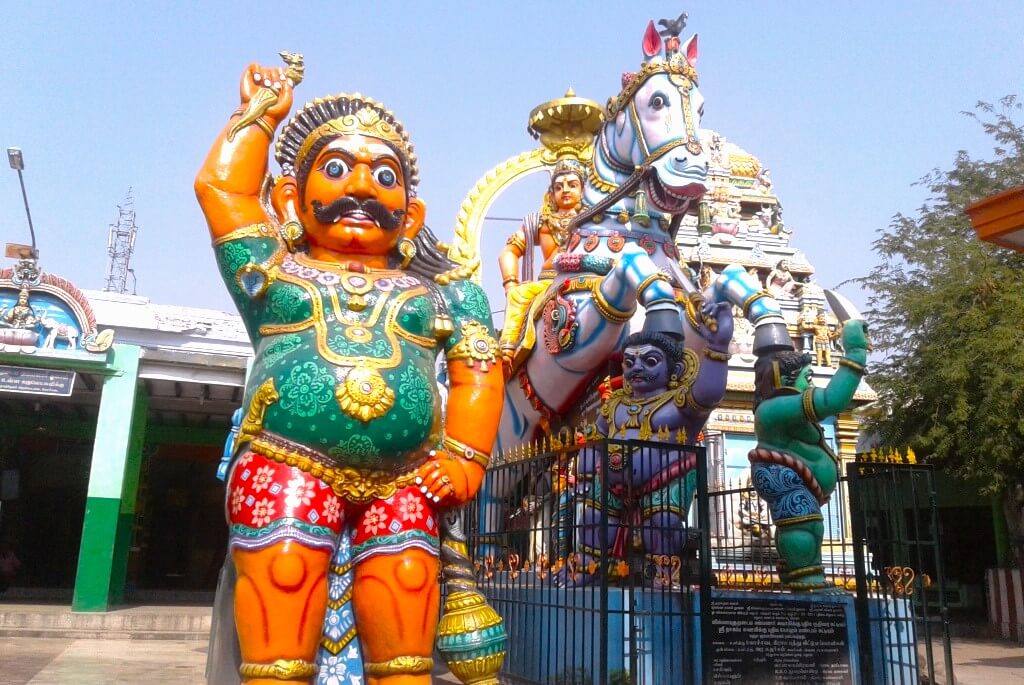
The Kochadai Muthaiyaa Kovil, also known as Kochadai Iyyanar or Muthiah Swamy Temple, is a Hindu temple located near the Kadayal hamlet, on the outskirts of Madurai. The temple is dedicated to the deities Iyyanar and Muthaiya Swamy. Iyyanar is worshipped for protection against evil, while Muthaiya Swamy is known for treating ailments. The main deity, Ayyanar, is depicted with a bow and is also known as Sri Villayudham Udaya Ayyanar Swamy. This temple is famous for its 21 village deities including Muthiahswami, Karuppuswami, Agni Veerabadrar, Karuppayi Amman, and others. The local community has great faith in these deities and regularly visit the temple to pray for good health, a successful harvest, and protection for their cattle. An important feature of the temple is the Nagamman (serpent) statue under a tamarind tree, where locals offer milk every Friday to seek relief from afflictions. The temple hosts the “Masi Vilakku” festival in February-March, and the Mahashivarathri festival for three days in February-March.
Madapuram Kali Temple, Madurai
Timings: 06.00 AM till 12.00 PM and 04.00 PM till 08.00 PM
Entrance fee: No
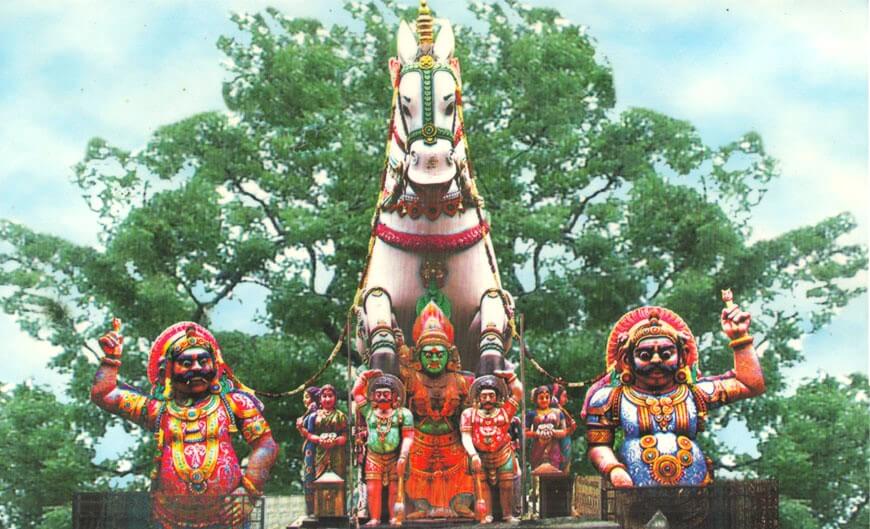
The Madapuram Kali temple is located in Sivagangai district and is dedicated to the ferocious Goddess Badrakali Amman. Unlike many other Kali temples, the statue of Kali stands tall on a stone pedestal in an open space with no roof. The temple is noted for its potent and transforming energy, drawing devotees seeking protection and positive change. The temple’s other main god is Adaikalam Kaatha Ayyanar, who serves as its protector. Special poojas are held every Friday, on the full moon day, and during the Tamil months of Aadi and Thai (August and January). Devotees believe that just hearing the name of Madapuram Kali will shake the miscreants, and the goddess shields them with strength and various wonders. Once a devotee’s wish is granted, they present the goddess with a lemon fruit garland.
Pandi Muneeshwarar Temple, Madurai
Timings: 06.00 AM till 12.00 PM and 04.00 PM till 08.00 PM
Entrance fee: No
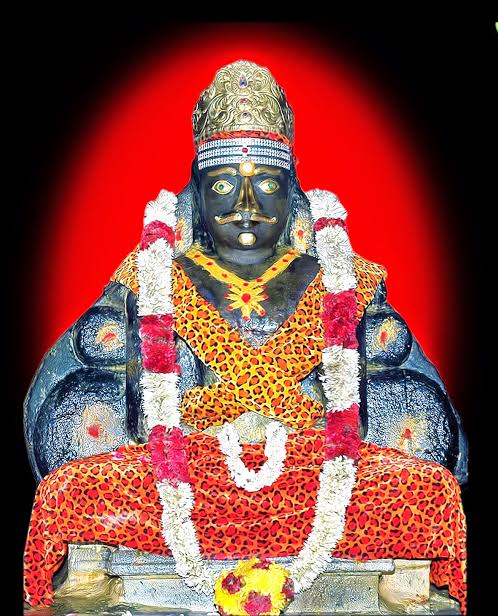
The temple is located in the Melamadai area of Madurai city, 2 km away from the MGR (Mattuthavani) bus station. The main deity is Lord Pandi Muneeshwarar, considered as the kaval deivam (rescuer) of Madurai. The temple has developed from a small hut to a proper temple. Lord Pandi Muneeshwarar is depicted as a powerful figure and devotees seek blessings for protection, good health, and success. The deity is in a seated position (Padmasanam) and showers blessings on devotees. Lord Pandi Muneeshwarar is linked to the Tamil epic “Silappathikaram.” Devotees offer him milk, Pongal, rosewater, and fruits. Samaya Karuppar is another deity worshipped at the temple. The temple is busy every day on the calendar, and people from various places visit to offer their prayers.
Other Tourist Attractions in Madurai
Gandhi Museum, Madurai
Entrance Fee: No
Timings: 10.00 AM to 01.00 PM & from 02.00 PM to 05.30 PM
Camera fee: Rs.50
Video Camera fee: Rs.50
Holidays: Closed on all Sundays, Government & National holidays
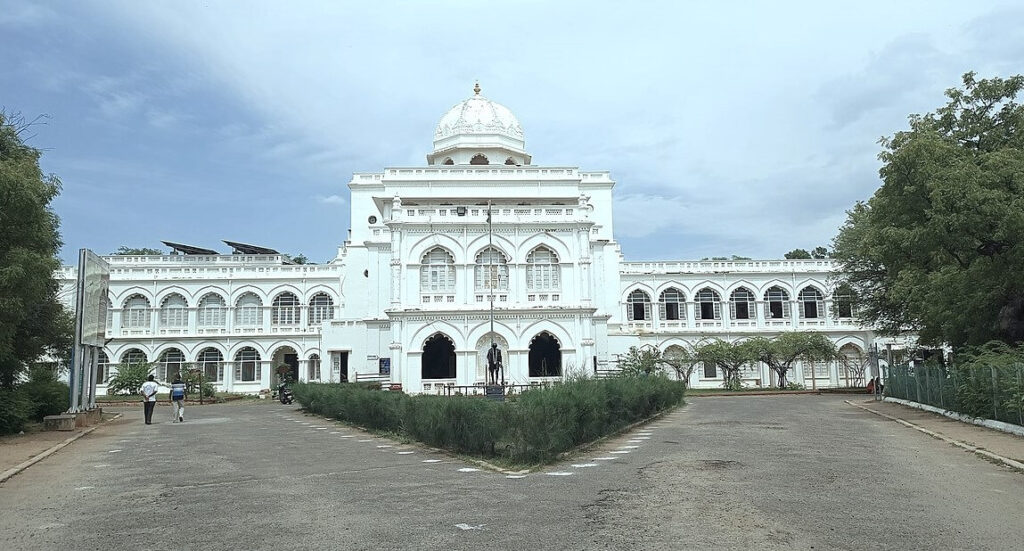
The Gandhi Memorial Museum in Madurai was established in 1959 to honor Mahatma Gandhi, a key figure in India’s fight for independence. The museum’s exhibits focus on different aspects of Mahatma Gandhi’s life and beliefs. Visitors can see a “Visual Biography of Bapuji,” which includes images, paintings, sculptures, manuscripts, and quotations tracing his life from his youth to his leadership in the Indian independence movement. Additionally, the museum houses meaningful artifacts such as a portion of Gandhiji’s blood-stained garment worn when he was assassinated, an original letter written by Gandhi, a congratulatory message sent by Gandhi to freedom fighter and poet Subramania Bharati, and a letter written by Gandhi to Adolf Hitler.
The museum also offers educational programs and activities promoting Gandhian values such as peace, nonviolence, and Satyagraha (truth force).
Thirumalai Nayak Palace, Madurai
Timings: 9:00 am to 1:00 pm, 2:00 pm to 5:00 pm
Sound & Light Show Timings: 6:45 pm (English), 8:15 pm (Tamil)
Ticket Charges: INR 10 (Adults), INR 5 (Children)
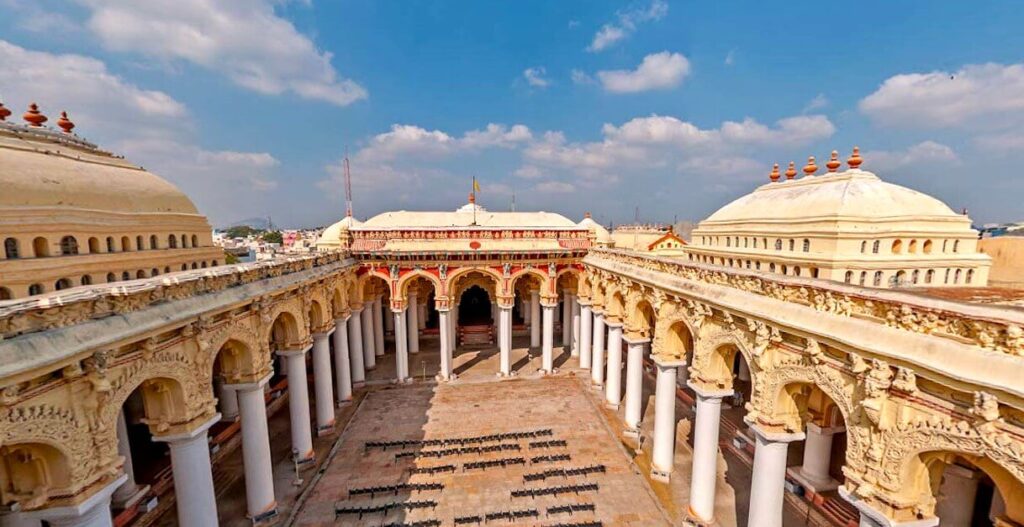
The Thirumalai Nayak Palace, built in 1636 by King Tirumala Nayaka, is a 17th-century palace located in Madurai. It offers a glimpse of the power of the Nayaka dynasty. It is a stunning example of Indo-Islamic architecture, combining Hindu, Islamic, and Dravidian elements. The palace is divided into two sections – Swarga Vilasam and Ranga Vilasam, offering insights into the royal residence The Swargavilasa Mandapam, or the Hall of Heavenly Delight, is the palace’s most remarkable feature. The hall, adorned with magnificent floral and geometric motifs, has a 60-foot (18-meter)-high dome and was used for royal audiences and special occasions. The palace is now under the care of the Tamil Nadu Archaeological Department and offering insights into the royal residence, workers’ quarters, religious places, and more.
Keezhadi Heritage Museum, Madurai
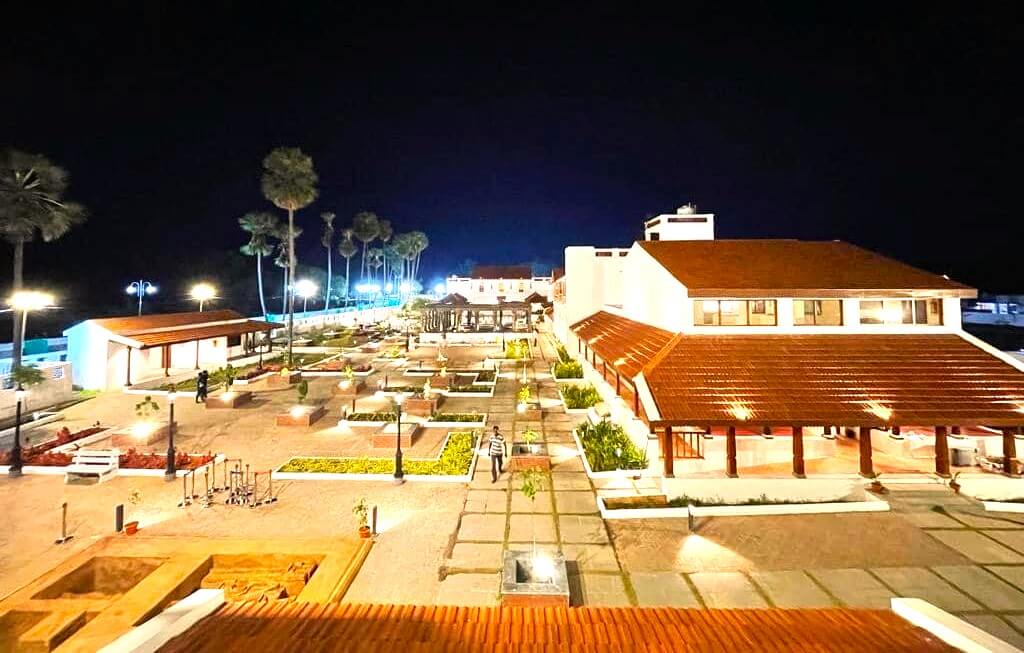
The Keezhadi Heritage Museum is located about 13 kilometers from Madurai. It was opened on March 5, 2023, by Tamil Nadu Chief Minister M. K. Stalin. The museum, covering 31,000 square feet, displays artifacts discovered since 2014 at the Keezhadi site. Archaeological excavations at Keezhadi have revealed a significant settlement from the Sangam period, dating back to the sixth and third centuries BCE. This challenges previous assumptions about ancient Indian urban development, suggesting that Tamil Nadu had a thriving urban center during this period. The museum’s exhibits provide insight into various aspects of life during the Sangam period, including agriculture, water management, weaving, and sea trade. Artifacts such as pottery, beads, and possible evidence of a writing system offer valuable information about the daily lives, trade, and culture of the people who lived in the region. The museum features multimedia elements, QR codes, and holograms to enhance the visitor experience. Additionally, an auditorium allows tourists to watch videos about the Keezhadi excavations and their significance.
Vegetable & Flower Market: Near Mattuthavani Bus Station
Time to visit: 06.00 AM till 05.00 PM
The vegetable and flower market is located near the Mattuthavani bus station. It is considered the main central market for selling fresh vegetables and flowers like roses, jasmine, and marigold on a regular basis. These goods are then distributed to various small-selling establishments across Madurai. Additionally, inside the market, there are small flower kiosks where the most vibrant garlands are created and sold.
Tailor Market & Spice Market around Meenakshi Temple
Time to visit: 10.00 AM till 09.00 PM
Many shops sell various spices and nuts around the Meenakshi temple, and tailors with sewing machines specialize in stitching clothing and fabric bags within the temple vicinity.
Vilacheri village
Time to visit: 09.30 AM to 06.00 PM
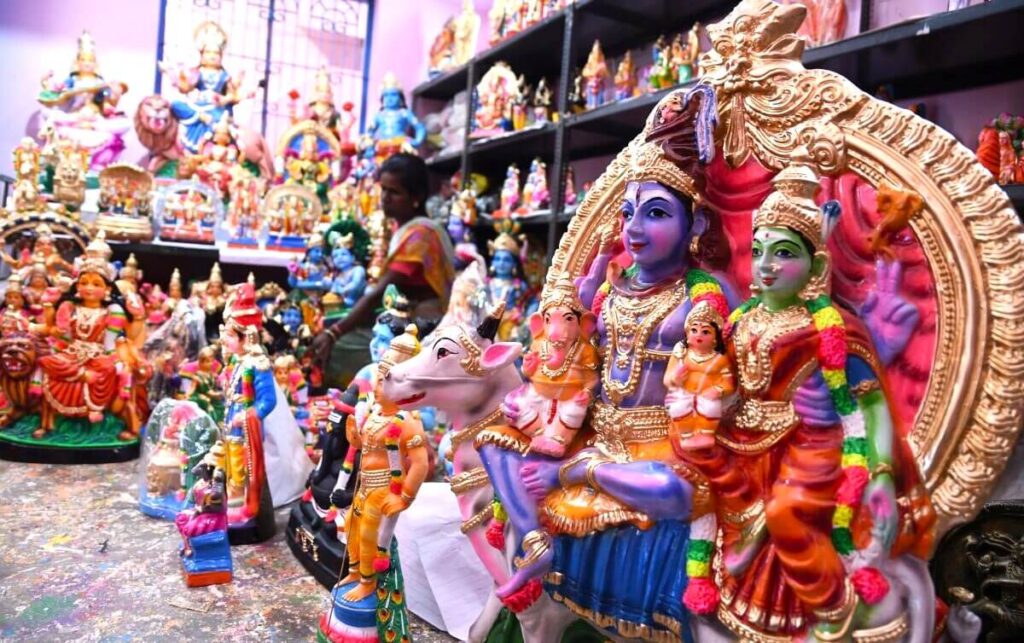
Vilacheri village is located 9 kilometers away from the city and is known for its pottery production. Over 250 households are involved in creating various mud toys and statues using clay and terracotta. The village is particularly famous for its “Golu dolls,” which are in high demand during the Navaratri festival. Craftsmen follow a multi-stage process throughout the year, with doll casting primarily done in the summer months for efficient drying. Base layers of paint are applied until July, and finishing touches are added closer to festive seasons like Navratri. The artisans typically work Monday to Saturday, depending on their schedules.
Popular Festivals of Madurai
Float festival (January / February)
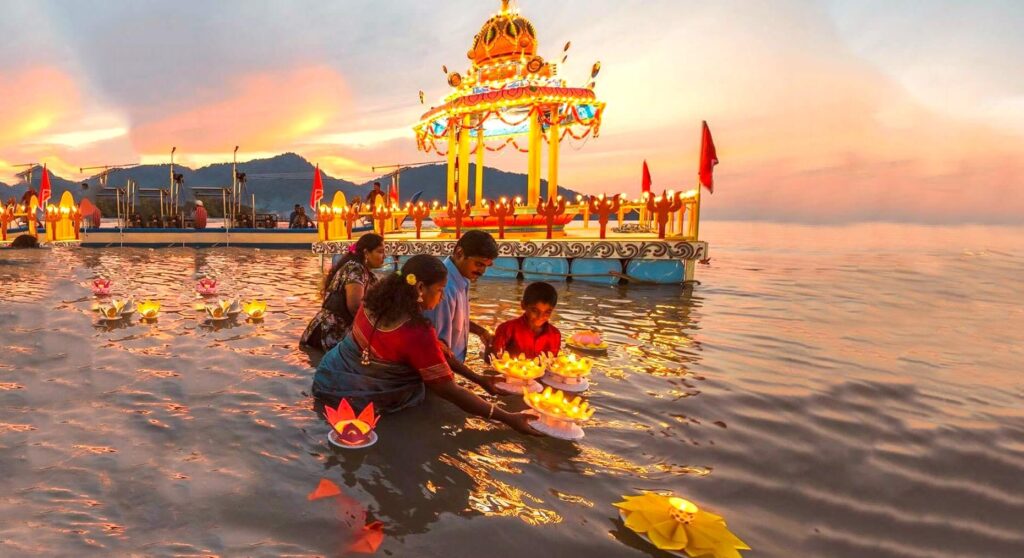
The Float Festival is an important celebration in Madurai, happening annually in January or February. It takes place on the day of the Poosam star and a full moon day to mark the birthday of the great king Thirumalai Nayak. Early in the morning, the idols of Lord Sundareswarar and Goddess Meenakshi are placed in a decorated palanquin and paraded to Mariamman Teppakulam and Meenakshi Amman temples. The idols are then placed on a raft adorned with colorful flowers and bulbs and floated in the Teppakulam water tank amid chants and music. After three rounds, the idols are brought to the central mandapam until the evening. In the evening, the idols are taken for a boat ride around the tank before being returned to the temple.
Note: Meenakshi Amman temple will be closed on this day.
Chithirai Festival (April / May)
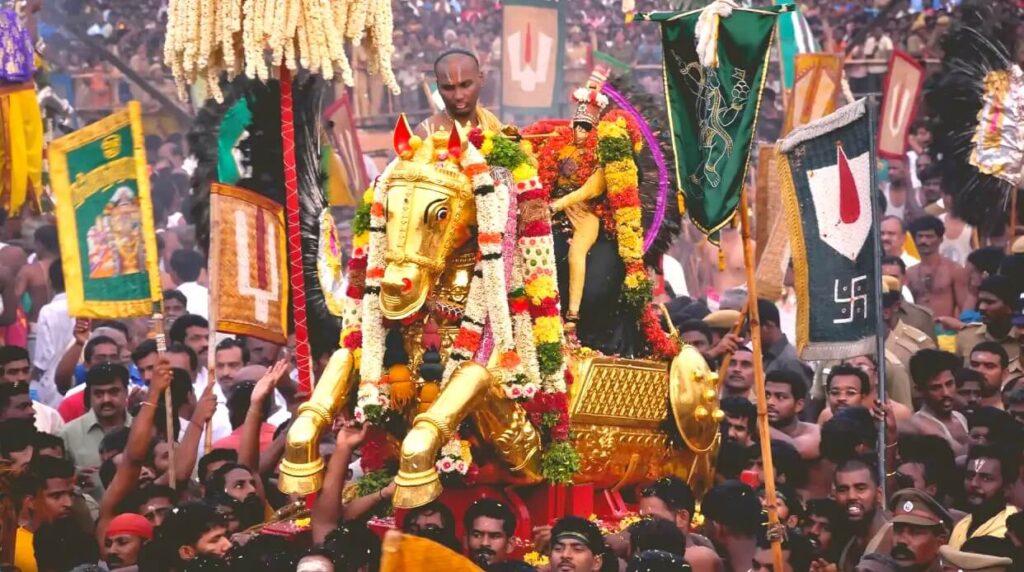
The Chithirai Festival in Madurai celebrates the celestial union of Lord Sunderswarar (Lord Shiva) and Goddess Meenakshi, known as Lord Vishnu’s sister. The festival, also called Chithirai Thiruvizha or Meenakshi Kalyanam, takes place at the beginning of April and lasts for 15 days. It brings together people of all castes and religions. Around a million people, including tourists, come to witness the event in Madurai, Tamil Nadu’s biggest temple. The festival begins with hoisting a flag and ends in the Kallazhagar temple. The festival also includes a chariot procession through the streets of Madurai, exhibitions, cultural shows, and entertainment programs.
Avani Moolam or Puttu Festival (August / September)
The Avani Moolam or Puttu Festival is an important religious celebration held at the Meenakshi Amman temple in Madurai during the Tamil month of Avani (August-September). The festival lasts 18 days and is dedicated to Lord Sundareswarar, depicting the various wonders performed by Lord Sundareswarar in 64 Thiruvizhayadals (holy games). The grandest wonder is “Puttuku Maan Sumantha Leela,” also known as the Puttu celebration, which commemorates the story of Lord Shiva and a poor old woman who sold puttu. The festival is held annually in the Tamil month of Avani, which corresponds to August or September on the Gregorian calendar. On the day of the Puttu Festival, Meenakshi Amman Temple will be closed, and idols of Lord Sundareswarar and Goddess Meenakshi will be carried in procession to Puttu Thoppu, where people can watch the event at 6:00 p.m. at Puttuthopu Thidal in Madurai. This year’s festival takes place on August 16, 2024.
Aadi Mulaikottu Festival (July / August)
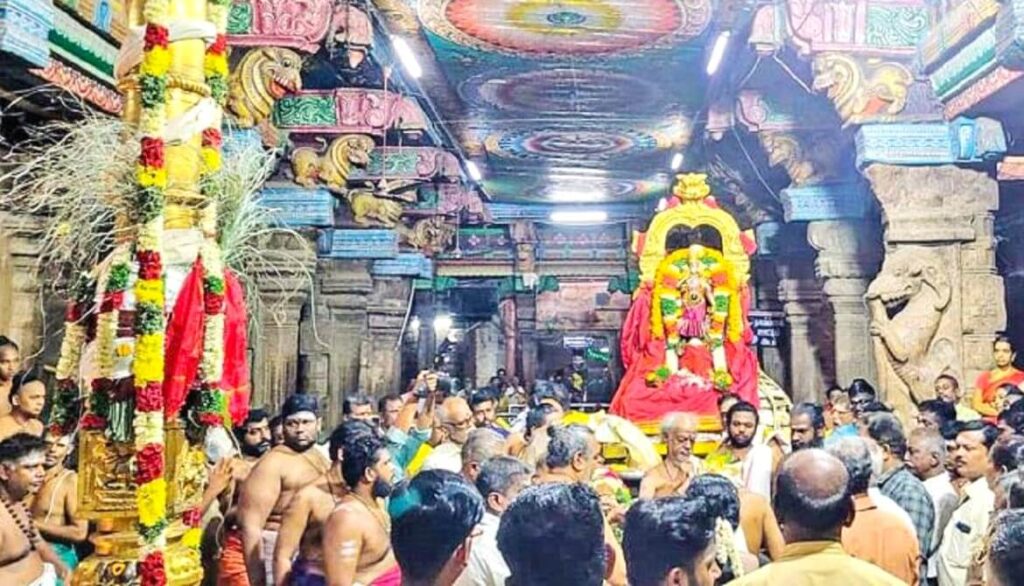
The Aadi Mulaikottu Festival is a ten-day celebration observed every year in the Tamil month of Aadi, which is around July-August in the Gregorian calendar. During these days, people focus on worshipping Goddess Meenakshi. The festival begins with a flag-raising ceremony on the first day of the Tamil month of Aadi and includes special prayers and cleansing rituals for Goddess Meenakshi. The festival concludes with a grand parade, featuring the idol of Goddess Meenakshi on a golden chariot, accompanied by music and cultural performances. Aadi is also considered an auspicious time for single women seeking suitable partners, during which they observe specific vows and perform prayers.
Panguni Uthiram Festival (March / April)
The Panguni Uthiram Festival is a famous event celebrated at the Thiruparankundram Murugan Temple. It takes place annually in March or April and lasts for 15 days. The festival features the celestial wedding of Lord Subramanya and goddess Devaiyanai (Devasena) on the 12th day, followed by a chariot feast the next day. Idols of Lord Sundareswarar and goddess Meenakshi from Meenakshi Amman temple are brought to Thiruparankundram temple to attend the wedding. The Meenakshi Temple will be closed on this day. The event will occur on March 10, 2025, and attracts a large number of people who come to witness the celebrations.
Vaikasi Visakam Festival (May)
The Vaikasi Visakam Festival is celebrated in May at the Thiruparankundram Murugan temple to honor Lord Subramanya. The festival commemorates Lord Murugan’s birth anniversary and is observed during the Tamil month of Vaikasi, specifically on the Visakam Star. Devotees from various parts of Madurai visit the temple to offer their prayers to Lord Subramanya in different ways. These include carrying milk pots (paal kudam) to perform Abhishekams, and carrying Kavadi as a symbol of seeking the Lord’s help and guidance. People also go barefoot to seek the Lord’s blessings.
Pongal festival & Jallikattu (Bull Tamming) (January)
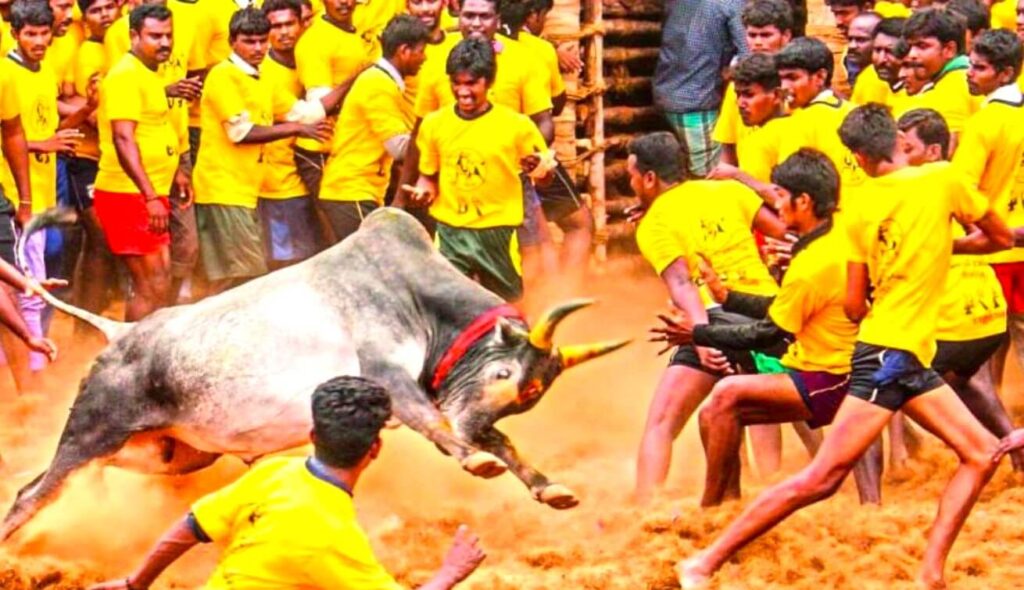
The Pongal festival and Jallikattu (Bull Taming) are celebrated in Tamil Nadu during the month of Thai (January). It is a three-day Harvest Festival that honors Lord Sun and farm animals for their contributions to a bountiful harvest. The highlight of the festival is the Jallikattu, a bull-taming event which takes place on the third day of the festival. It is a significant historical sport celebrated in and around Madurai, where young people from neighboring villages compete in controlling the bulls to demonstrate their bravery. The event takes place at three locations in Madurai: Avaniyapuram, Paalamedu, and Allanganallur. The festival dates are from January 14th to January 17th.
Interesting Activities in Madurai
Vanakkam Madurai
Timings: from 05.45 AM to 08.00 AM (the guests have to start from the hotel around 05.30 AM)
“Vanakkam Madurai” is a special walking tour designed for visitors to Madurai. The tour starts at 6 am and lasts for about 2 hours. It provides an authentic experience of the local lifestyle in Madurai, one of the oldest and culturally rich cities in India. During the tour, visitors will be accompanied by a member of the Vanakkam Madurai team, who will guide them through the city, explaining various aspects of local life such as traditions, daily habits, street vendors, and markets. This tour is aimed at immersing visitors in the culture and everyday life of an Indian city.
For more details: https://vanakkammadurai.com/
Food Safari
Timings: 06.00 PM to 08.00 PM
Join us on a culinary tour to experience the local cuisine of Madurai, known as the food capital of Tamil Nadu. At the Madurai Food Safari, you’ll visit different food outlets to sample authentic local dishes in the evening. This will allow you to enjoy the nighttime ambiance of Madurai while savoring delicious food.
Jain Circuits in and around Madurai
Madurai, an ancient city, was a significant center for Jainism during the 3rd and 4th centuries. The influence of Jain culture and traditions can still be observed in and around Madurai. Jain monks resided in rock hills and caves, where they meditated and conveyed their beliefs to their followers. Some of the major Jain caves within a 30-kilometer radius of Madurai include Mangulam, Anaimalai, Arittapatti, Alagarmalai, Keelavalavu, Thiruvathavur, Varichiyur, Karungalakkudi, Thirupparankundram, Muthupatti, Kongarpuliangulam, Mettupatti, and Vikramangalam. These caves contain authentic evidence of Jain practices and settlements and feature sculptures of Mahavir Tirthankara as well as early text forms from the 2nd BC to the 4th AD in Brahmi and Vallezhuthu script.
Conclusion
Madurai’s historical significance, cultural legacy, and active customs make it an ideal destination for those seeking a voyage through time. Visitors are immersed in the intriguing story of Madurai’s long legacy as they tour the city’s historic temples, savor its wonderful cuisine, and attend its colorful festivals.

